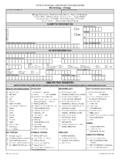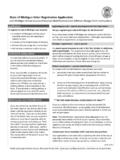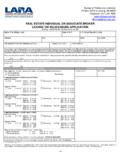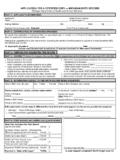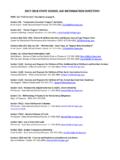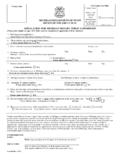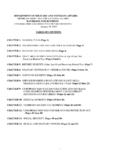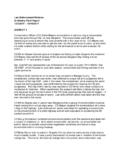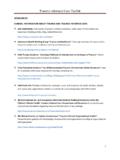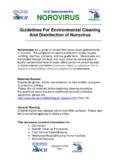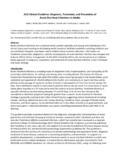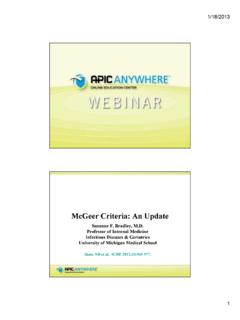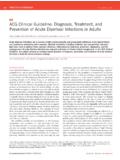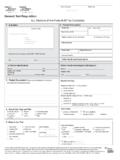Transcription of Guidelines for the Control of a Suspected or …
1 Guidelines for the Control of a Suspected or Confirmed Outbreak of viral gastroenteritis in a Nursing Home These Guidelines have been developed to help stop the spread of viral gastroenteritis (norovirus) in nursing homes. Norovirus is highly contagious and environmentally stable, so stringent adherence is necessary. Preventive measures should be continued for at least 7 days after the outbreak appears over, since infected persons continue to shed the virus after they have recovered. Residents: 1. Isolate ill residents from others by confining them to their rooms (until 3 days after their last symptoms of nausea, vomiting, and/or diarrhea).
2 Ideally, keep all residents in their rooms and serve meals in rooms. 2. Cohort (group) ill individuals together down the same hall, wing, or unit, if possible. 3. Discontinue group activities where ill and well residents would be together ( , meals, parties, BINGO, card tournaments). Group activities should be kept to a minimum or postponed until the outbreak is over. Staff: 4. Ill staff should remain out of work for 2-3 days after symptoms have ended. 5. Minimize the flow of staff between sick and well residents. Staff should be assigned to work with either well residents or sick residents, but should not care for both groups.
3 Staff who go back and forth between ill and well residents, play an important role in transmitting the virus from resident to resident. Staff should not float between different facilities either. 6. Staff should wash their hands when entering and leaving every resident room. 7. Staff should wear gloves when caring for ill residents who are vomiting, experiencing diarrhea, or when touching potentially contaminated surfaces. Gloves should be discarded and hands washed immediately after completing patient care. 8. Masks should be worn when caring for residents who are vomiting.
4 Michigan Department of Community Health Communicable Disease Division 201 Townsend Street, CVB - 5th Floor, Lansing, Michigan 48913 p: 517-335-8165 f: 517-335-8263 Housekeeping: 9. For outbreaks, use bleach for disinfection (see Guidelines for Environmental Cleaning and Disinfection of Norovirus for specific concentrations). a. Environmental Protection Agency (EPA) approved disinfectants against norovirus are available but field effectiveness in the context of outbreaks has not been evaluated. b. Disinfect surfaces such as handrails, doorknobs, light switches, physical/occupational therapy equipment, etc.
5 10. Contaminated carpets should be cleaned with detergent and hot water, then disinfected with a hypochlorite solution (if bleach-resistant) or steam cleaned. 11. Housekeeping staff should wear gloves and masks when cleaning contaminated or potentially contaminated surfaces or laundry. Contaminated linen and bed curtains should be carefully placed into laundry bags (to prevent generating aerosols) and washed separately in hot water for a complete wash cycle ideally as a half load for best dilution. Visitors: 12. It may be prudent to discontinue visitation to the nursing home until the outbreak is over.
6 A. If visitation is allowed, visitors should go directly to the person they are visiting and not spend time with anyone else. b. Signs should be posted to warn visitors of the outbreak, so individuals do not put themselves at risk. c. Visitors should wash their hands upon entering and leaving the room or facility. 13. Visitors should not enter the nursing home if they are sick. Michigan Department of Community Health Communicable Disease Division 201 Townsend Street, CVB - 5th Floor, Lansing, Michigan 48913 p: 517-335-8165 f: 517-335-8263
